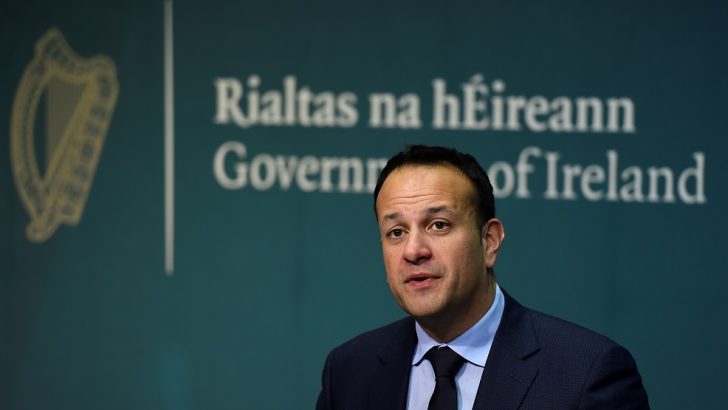Last week Covid-19 had to share the media limelight with the report of the Mother and Baby Homes Commission – grim stories from past and present.
In the blanket coverage first and foremost there were the heart-breaking stories of mothers and their babies, the personal stories of residual hurt and anger made all the more raw by being dragged into the light again. Liveline (RTÉ Radio 1) proved the ideal vehicle for these stories, though pretty much every news and current affairs did likewise. Some stories were high profile, while others were new – both featured in Prime Time (RTÉ One, Tuesday) when we heard of the experience of former Minister Joan Burton, adopted from one of the homes and from Terri Harrison who was in the Bessborough home in the 1970s.
The political reaction was the hardest to take. Apologies were welcome but much of it sounded hollow, even hypocritical, agenda-driven and too slickly crafted. Watching Dáil coverage live on RTÉ News Now (Wednesday) it was galling to hear the Tánaiste Leo Varadkar speaking of a “a stolen generation”, when his own government so recently created another stolen generation – the thousands of babies whose lives are deliberately ended through abortion. It was telling that as he listed what he regarded as the “social progress” of the last 30 years, he did not include repeal of the Eighth Amendment. I heard the Taoiseach Micheál Martin (Sky News, Tuesday) speaking of how we “treated children exceedingly badly”, though he also helped facilitate the law that deprived children of their very right to be born, despite the UN Convention on the Rights of the Child requiring the State to respect children’s rights “before and after birth”. I find it hard to take politicians lamenting the abuses of the past even as they create the abuses of the present – are we doomed to endless cycles of cruelty and injustice?
The Church and religious congregations were mercilessly bashed through the week. No doubt there were cruel nuns and cranky nuns, but I feel for those who dedicated their lives to the compassionate service of others. Now they’re all being tarred with the same brush. Some of the criticism was deserved – some elements in the Church provided the sticks that the Church was beaten with. Archbishop Eamon Martin was quick to issue an apology and did a more detailed interview on last Sunday’s This Week programme (RTÉ Radio 1). He spoke of a “deep sadness” at the “harrowing stories” and expressed admiration for the “courageous women” that had come forward – they were shamed, excluded and ostracised by a society that ignored their rights. Without dodging responsibility, he felt that absent fathers, county councils and the broader state shared the moral responsibility.
Where the report didn’t fit the expected and common narrative it was harshly criticised – again on that RTÉ News Now coverage we saw the strong attacks by TDs like Catherine Connelly who was again passionate in her criticism on last Monday’s Breakfast Show (Newstalk). Commentators found fault with the processing of testimonies and the findings that women weren’t forced into these homes by Church or State, that most adoptions were done with some level of consent, that there wasn’t proof the orders benefited financially from the adoptions.
Some were unhappy with broad society being blamed, though obviously societal attitudes were part of the problem. Nevertheless, religious orders and the Church in general should practice a higher standard, should always be counter cultural if the culture is unforgiving, cruel or lacking in compassion. The report does acknowledge instances where high standards were practiced but tellingly it wasn’t in mainstream media that I learned this.
Seamus Mulconry of the Catholic Primary Schools Management Association (CPSMA) was interviewed with sensitivity by Shane Coleman on Newstalk Breakfast last Friday when he spoke of his own adoption story – a happy one from the more recent tail end of the system in the 1960s (see page 16). While finding the stories “genuinely shocking”, he thought it was too easy to demonise and assume moral superiority. He wasn’t sure that if we were back there in the same circumstances that we’d behave any better.
Finally, after the ‘God skit’ apology, I didn’t think RTÉ would transgress so soon afterwards, but there was a scene in the comedy show Seriously Sinead (RTÉ 2, Thursday) where a priest fires communion hosts around a church as if they were confetti.
Time for a learning curve?
Pick of the Week
Songs of Praise
BBC One, Sunday January 24, 1.15pm
Marking the year Songs of Praise turns 60, Aled Jones celebrates at St George’s Chapel in Windsor with Christian stories that exemplify the spirit of the series.
The Diary of Anne Frank
BBC 4, Sunday January 24, 7pm
Episode I: June 1942. Amsterdam is under Nazi occupation during World War II. Anne Frank, a teenage Jewish girl, and her parents, Otto and Edith, decide to hasten their plan to go into hiding.
40
EWTN Monday January 25, 9pm
Forty years after the Roe v. Wade decision, this provocative pro-life film chronicles the impact on women, children and society.


 Brendan O’Regan
Brendan O’Regan An archive photo of now ex-Taoiseach Leo Varadkar
An archive photo of now ex-Taoiseach Leo Varadkar 